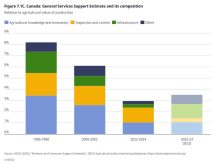When Bill 18 the Grain Marketing Freedom for Farmers Act becomes law, the board s 10 farmer-elected directors will be fired and the five remaining government-appointed directors, including current president and CEO Ian White, will be in charge.
Grain companies will be allowed to forward contract wheat, durum and barley for the 2011-12 crop year. The board s monopoly remains until July 31, 2012, with an open market beginning Aug. 1.
The wheat board, which will offer a voluntary pool, will also be allowed to engage in cash sales for all grains.
Read Also

Best before doesn’t mean bad after
Best before dates are not expiry dates, and the confusion often leads to plenty of food waste.
The federal government will guarantee the board s borrowings and initial payments for five years. The board will not get capital to buy grain-handling facilities, nor legislated access to elevators and ports as it requested. The board has up to four years to design a plan to privatize, sell or wind down.
At the end of the day it will be up to farmers to make use of the entity or it will not survive, Agriculture Minister Gerry Ritz said.
The government will cover the wheat board s transition costs, including employee severances and pensions.
Over the next five years Ottawa will also subsidize grain shipments through the Port of Churchill. (See sidebar.)
Bill 18 also sets up a national voluntary farmer checkoff to continue funding the Western Grains Research Foundation, Canadian International Grains Institute and Canadian Malting Barley Development Centre.
The bill is being fast tracked to give the grain industry clarity, Ritz said.
It s irresponsible and reckless for the government to pass Bill 18 without a fulsome debate, NDP MP Pat Martin said. However, I m afraid they ve got us boxed in.
Martin doesn t believe the courts will or should overturn the legislation.
Section 47.1 of the wheat board act obliges the government to hold a farmer vote before changing the board s marketing powers.
Parliament is the highest court in the land, Martin said.
It would throw the country into a constitutional crisis if every piece of legislation tied the hands of future governments from ever changing that legislation. It simply wouldn t work.
The Friends of the Canadian Wheat Board has launched legal action based on 47.1 to be heard in Federal Court Dec. 6.
The wheat board is also considering legal action, board chair Allen Oberg said. This is not about putting farmers in the driver s seat, it s about throwing us under the bus and handing the steering wheel to huge American and European multinationals that control the world s grain trade, Oberg said.
The Canadian Federation of Agriculture says farmers, not the government should decide the board s mandate. It also wants the bill to be fully debated in the House of Commons and reviewed by the Commons agriculture committee.
The Keystone Agricultural Producers (KAP) said it is disappointed the bill doesn t ensure producer car viability and include stronger anti-competitive oversight.
While some farm groups called the bill undemocratic, farm groups that support an open market, including the Grain Growers of Canada, praised the bill and thanked Ottawa for making it happen.

















